Buying a food truck isn’t like buying a pickup truck. You can’t just go down to the food truck dealership and wander around, kicking tires until you see something that catches your eye.
Choosing a truck (and figuring out how to pay for it) are important business decisions that should be made with your overall business plan and strategy in mind. So as you consider your options and weigh the costs, here are a few of the many items to review before buying a food truck.
How Much Does a Food Truck Cost?**
The cost of your food truck will depend on many variables: new vs. used, the size of the truck, and whether it’s custom-designed or built based on a template. But a new food truck will generally average between $100,000 and $175,000. That’s a substantial upfront investment. If you have the cash, great! But for many entrepreneurs, the startup funding has to come from outside sources.
So how can you buy a food truck with no money (or with very little money)?
You could start out by renting instead of buying—which we’ll discuss later. You could also consider bringing on a business partner to front some of the startup costs in exchange for equity in the company. Or you could consider taking out a business loan backed by the Small Business Administration (SBA), which may offer moderate interest rates and limited fees.

A small business loan may help you to get the necessary funding to buy or begin renting a food truck.
Another way you might want to consider to get funding for your food truck is to borrow money from friends and family, offering them a portion of the profits as you start to earn or a payment schedule with interest. Or you could reach out to the wider community by crowdfunding your startup costs. Sites like GoFundMe and Kickstarter can be successful in helping small businesses to get off the ground.
With all of these options, lack of money doesn’t have to be a barrier to buying or renting a food truck.
Buying a New vs. Used Food Truck
While a new food truck could run up to $175,000 (or more), you may be able to purchase a used truck for $50,000 to $100,000 — or possibly less, depending on the truck. Is it worth it to save as much as $100,000 by buying a used truck?
It certainly could be! Here are some of the pros and cons of a new vs. a used food truck:
Pros of Buying a New Food Truck
- You can get it custom-designed to suit your needs
- You can get it built and designed to meet your local code requirements
- There will be no wear-and-tear, and it’s less likely to have hidden mechanical problems
- It will probably come with a warranty
- There’s less risk of a breakdown and costly repairs for the first few years of ownership
Cons of Buying a New Food Truck
- A new truck is generally more expensive than a used food truck
- You may not know the best workflow until you’ve been in business for a while, so the design for your new truck may not actually meet all your needs
- Building a new custom truck may take up to six months, so it will likely be a while before you can start generating revenue and cashflow
Pros of Buying a Used Food Truck
- Used trucks are generally less expensive than new food trucks
- The bulk of the equipment is already installed, so you can start cooking and making money sooner
- The smaller upfront costs may make it easier to afford customizations to your truck in the future
Cons of Buying a Used Food Truck
- A used truck may need more repairs over time
- There could be hidden damages that you don’t discover until after your purchase
- A used truck may not meet code requirements, especially if you buy it outside of your geographic area, so it may need pricey renovations before it can get permitted
- Used trucks may have cosmetic damage that will need to be covered up for a professional look
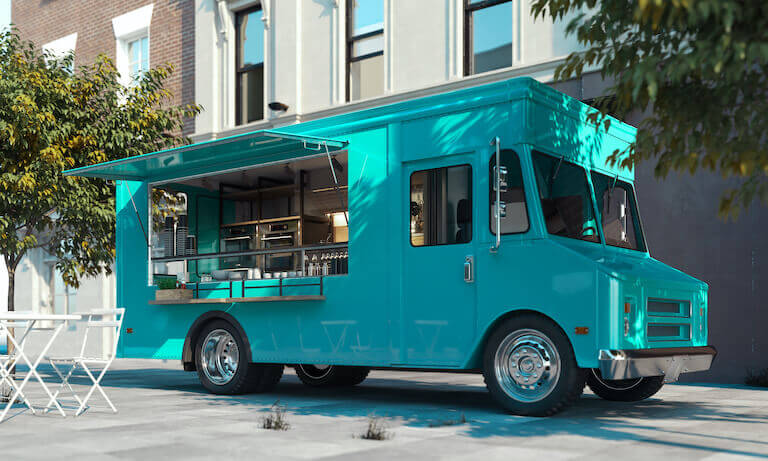
A fresh paint job or vinyl wrap can make a used food truck look like new.
If cost is a major factor for you, a used food truck may be the way to go. Just make sure you budget for the inevitable repairs and maintenance that you may be responsible for with any food truck purchase.
How to Find a Food Truck for Sale
Once you’ve decided on new vs. used and have an idea of how you’re going to pay for it, how can you find a food truck for sale? Is there a “Food Trucks ‘r Us” somewhere?
Not exactly. But there are reputable food truck dealers out there. And when you’re investing five or six figures into your truck, you will certainly want to buy from someone you can trust.
Where to Buy a New Food Truck
For new trucks, there are a number of well-known manufacturers to consider, like Custom Trailer Pros or Chef Units. Conduct your own research to find the best manufacturer for your situation and needs.
You may also want to consider a local manufacturer if you’re planning to operate your food truck within your region. Since each city has its own unique rules and regulations regarding truck specs, a local maker may have a better sense of what your truck must have to be permitted. And that can save you major headaches down the line.
To find a local builder, try Googling “food truck fabricator [city].” You can also reach out to some local truck owners to see if they can make a recommendation.
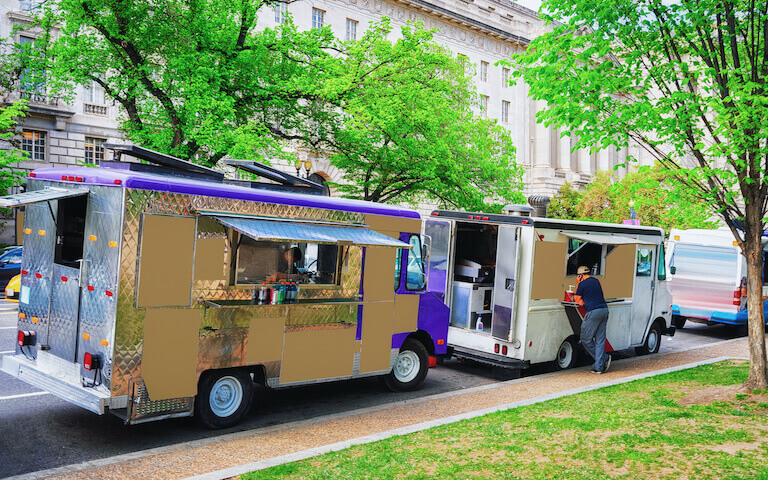
Ask existing food truck operators if they have a recommendation for a good local fabricator.
Where to Buy a Used Food Truck
Used trucks are often sold by owners, which means you may be looking among a marketplace of individuals rather than a single vendor.
The website Roaming Hunger has a great database of food trucks, trailers, and carts for sale. You may be able to find a truck with equipment in like-new condition, or a simple truck that’s ready to be converted into a food truck. Other online options include Used Vending. These are only suggested sources to consider when beginning your search.
When buying a used food truck, make sure to do your due diligence. If possible, bring someone with food truck expertise with you to do a thorough inspection of the truck before buying. Ideally, this would be the person who will be doing any remodeling work on the truck, so they can provide a cost estimate.
You may also want to bring a mechanic to assess what’s under the hood. Even if you have to pay a few hundred dollars for their time, it may be worth it if it prevents you from making a $50,000 mistake!
Customizing Your Food Truck for Your Business Model
What equipment and supplies do you need for your food truck? This will depend on what you plan to serve and the size of your truck.
A pizza truck will need pizza ovens, for example, If you are cooking fresh food in the truck vs. re-heating previously cooked food from a commercial kitchen. And a sandwich truck may need a “mega top,” a refrigerated cabinet with individual compartments for toppings like lettuce, tomatoes, cheese, and more. A burger truck that makes french fries needs a fryer. And a Chinese food truck may need gas burners for wok cooking.
Regardless of your particular truck, you may need a three-compartment sink for washing dishes and a dedicated hand sink. You might need refrigeration for your food and you may need a freezer. You may consider a hood vent over your stovetop, and you may need some kind of fire suppression system. You may also need a freshwater tank, a greywater tank, and possibly a generator.
How do you fit it all into a 16’, 14’, or even a 12’ food truck? That’s the Tetris that your truck manufacturer or remodeler will have to perform. There are compact versions of some of this equipment available specifically for trucks, which a good builder should know about.
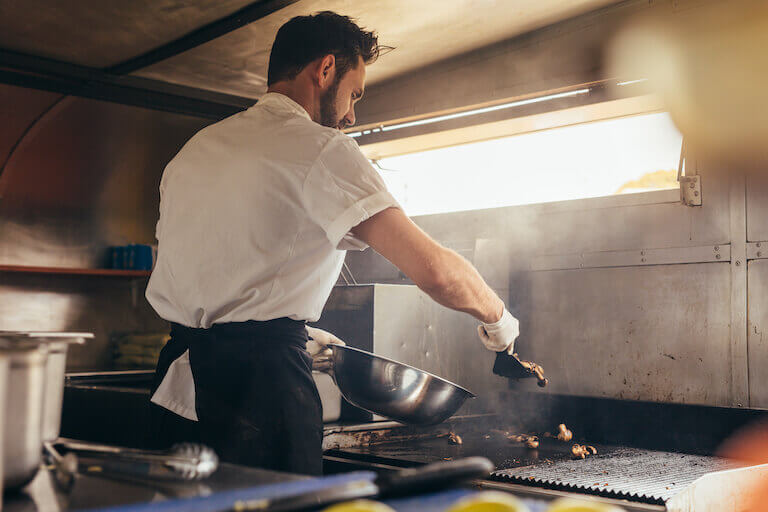
Space is at a premium, so you can only have vital equipment in your truck.
How Does Customizing Your Own Truck Work?
Once you’ve found a qualified fabrication company you think you’d like to work with, you can have an initial conversation about what your equipment needs are, where you’ll be operating, what type of food you’ll be serving, and your budget.
Based on the information you provide, the company can provide a quote and start to work on your custom blueprints. You and the fabricator may go back and forth on the design, making edits until it’s just right.
After the design is approved, the fabricator can begin building. For a custom build, it could take up to six months for the truck to be complete. Or it could be longer, if the fabricator runs into issues.
Once you receive your truck, you will have to go through the process of getting the permits you need to legally operate your food truck.
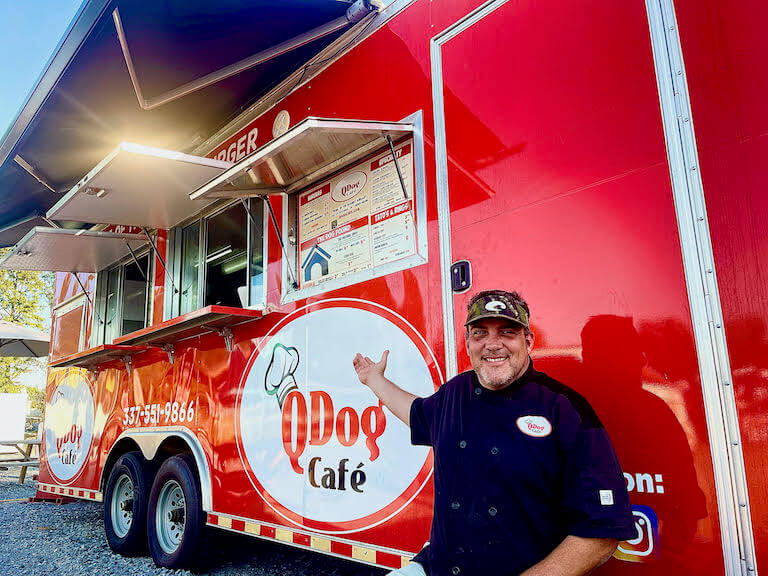
You don’t have to go big right away. Escoffier graduate Quentin Adcock started QDog Café in a smaller food trailer, and upgraded to this larger truck when business grew.
Renting vs. Buying a Food Truck
If spending $50,000+ on a food truck purchase seems like too big of a gamble for your business plan, there’s another option. You could rent your food truck. Now, instead of paying five or six figures to own a truck, you’ll be responsible for a monthly lease—probably between $3,000 and $5,000 per month.
If you rent, you may not have the same kind of customization options for your truck that you would have if you purchased it. But you also might not be stuck with the debt of a large purchase if your business doesn’t work out.
Keep in mind that renters may be faced with the complexity of changing trucks at the end of their lease term. This can be costly and lead to downtime when the truck can’t operate. But some leases offer rent-to-own options, which could be a smart way to get a business started with lower startup costs and offer a path to ownership.
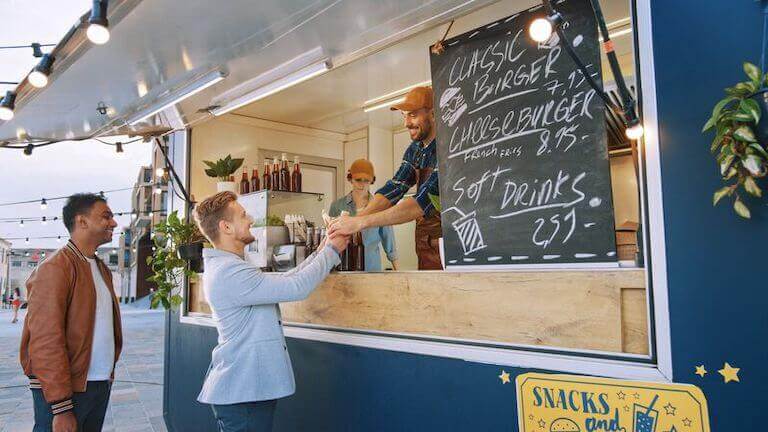
With temporary additions like chalkboards, signs, and lighting, you can still make a rented food truck reflect your brand.
Get Advice From Those Who Have Been There Before
Buying a food truck is a substantial investment, so don’t rush. Take your time, do your own analysis, and get advice from others who have already gone through the process.
There are quite a few food truck owners/operators among the alumni at Auguste Escoffier School of Culinary Arts who could be helpful sources of information.* Graduates of our Food Entrepreneurship program (and all other programs) can join the Escoffier Alumni Association where they may be able to connect with others to learn from their experiences.
“Escoffier’s program has helped me put together how to create a business that’s sustainable. The school is really good at giving you the points to follow, almost like an outline. Now I actually have a format and a disciplined way to look at a restaurant design or come up with a menu.”*
Chef Freida Nicole, Escoffier Graduate & Owner, Freida’s Sweets & Meats
Find out how a Food Entrepreneurship education at Escoffier can provide valuable marketing, food business essentials, and operational education to help you create a business plan and approach your food truck the smart way!
To learn more about operating your own food truck, try these articles next:
- Food Truck Marketing: A How-To Guide
- The 5 Best Food Truck POS Systems
- How To Choose the Best Location for Your Food Truck
*Information may not reflect every student’s experience. Results and outcomes may be based on several factors, such as geographical region or previous experience.
**Figures included in this article are for informational purposes only and are estimates based on industry trends or a range of costs/expenses. Please research costs for your geographic location and individual situation.

 “Escoffier’s program has helped me put together how to create a business that’s sustainable. The school is really good at giving you the points to follow, almost like an outline. Now I actually have a format and a disciplined way to look at a restaurant design or come up with a menu.”*
“Escoffier’s program has helped me put together how to create a business that’s sustainable. The school is really good at giving you the points to follow, almost like an outline. Now I actually have a format and a disciplined way to look at a restaurant design or come up with a menu.”*

